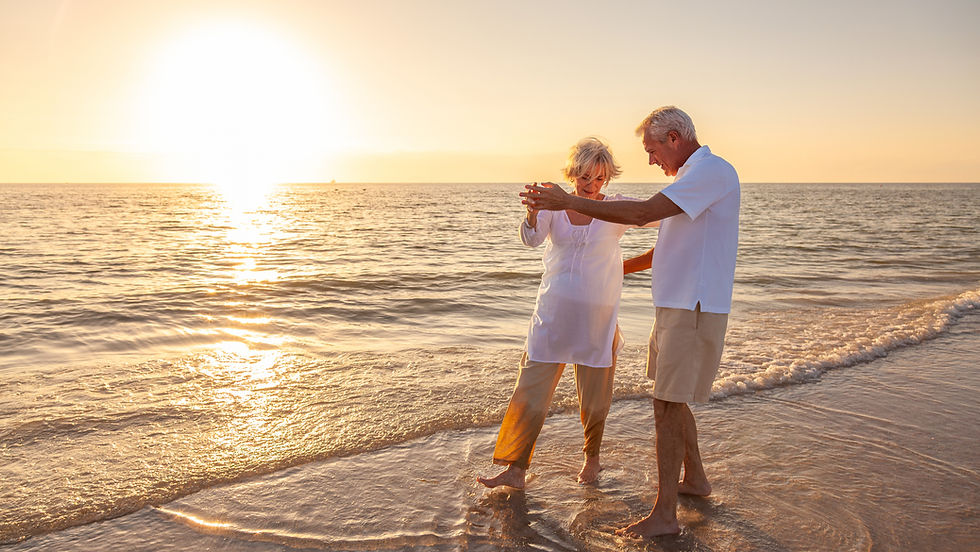
Summer Health Watch: Common Warm-Weather Ailments in Older Adults & How to Keep Them at Bay
Share

Hot days can be wonderfully social and active—but they also bring a unique set of challenges for people in their mid-60s and beyond. Below is a practical, evidence-based guide you can publish as-is (or adapt to your voice) that pairs each summer ailment with simple, actionable steps for prevention or relief.
1. Heat Cramps, Heat Exhaustion & Heat Stroke
Why they happen
Ageing skin sweats less and circulatory reflexes slow down, so the body sheds heat more sluggishly.
Action Plan:
|
Schedule hydration, don’t wait for thirst |
Aim for 150–250 ml (½–1 cup) water every 20–30 minutes outdoors. Include an oral rehydration drink or a low-sugar sports beverage once or twice daily if sweating heavily. |
|
Use the “20-20 rule” |
For garden work or walks, spend no more than 20 minutes in direct sun, then cool indoors or in shade for 20 minutes. |
|
Know emergency signs |
Confusion, hot/dry skin, or a core temp ≥ 40 °C (104 °F) warrant a 999 call—cool with wet clothes or a cool bath while awaiting help. |
2. Dehydration & Electrolyte Imbalance
Why they happen
Thirst perception blunts with age; diuretics, laxatives, or SGLT-2 diabetes drugs accelerate fluid loss.
Action Plan:
- Morning “baseline” test: Check urine colour after breakfast; if it’s darker than pale straw, start extra fluids early.
- Smart salt: Pair water with salty snacks or a pinch of table salt in juice to keep sodium from plunging (unless on a salt-restricted diet).
- Medication review: Ask the doctor whether summer warrants dose tweaks for diuretics, ACE inhibitors, or lithium.
3. Heart Strain & Blood-Pressure Swings
Why they happen
Heat causes peripheral vasodilation—blood pools in the limbs, lowering effective circulating volume and BP.
Action Plan:
- Rise slowly: Pause seated for 60 seconds before standing to prevent “heat syncope.”
- Compression stockings for the win: Light-grade (15–20 mm Hg) stockings can curb pooling if tolerated.
- Daily weight & symptom log: Sudden 1–2 kg gain, ankle swelling, or worsening breathlessness signal heart-failure flare; call the care team promptly.
4. Breathing Troubles & Poor Air Quality
Why they happen
Ozone, wildfire smoke, and Saharan dust peaks often accompany heat waves, irritating lungs.
Action Plan:
|
Check the AQI before outings
Create a “clean-air room”
Have a “rescue bundle” ready |
Free apps like AirNow or local meteorology sites provide real-time Air Quality Index; keep outdoor exercise for AQI < 100. Run a portable HEPA filter in one closed room; spend the hottest, smoggiest hours there. Ensure inhalers aren’t expired, speak with the GP about a written COPD/asthma action plan, and refill steroids well before summer. |
5. Kidney & Urinary Complaints
Why they happen
Concentrated urine fosters infection and stone formation; dehydration can tip vulnerable kidneys into injury.
Action Plan:
- Target 1.5–2 litres urine output/day: Practical cue is needing to void every 2–4 hours while awake.
- Fruits beat fizz: Citrus and melon boost citrate (stone inhibitor) and fluids without the sodium of sodas.
- Prompt UTI checks: Unexplained confusion, falls, or fever in older adults may be a “silent” UTI—seek a urine test quickly.
6. Skin & Eye Hazards
Why they happen
Thinner dermis, photosensitising meds, and lifetime UV accumulation raise risk.
Action Plan:
- SPF 30+ broad-spectrum sunscreen reapplied every two hours (more if sweating or swimming).
- Lightweight, long-sleeved UPF clothing—loose linen or modern sun-protective fabrics keep skin cooler than short sleeves alone.
- Hat + wrap-around shades with UV 400 lenses to shield cataract-prone lenses and retina.
7. Medication Mishaps
Why they happen
Anticholinergics, tricyclics, some antihistamines and antipsychotics suppress sweat or thirst; insulin loses potency in heat.
Action Plan:
- “Cool-cab” storage: Keep medicines between 15 °C and 25 °C (59–77 °F); use insulated pouches during travel.
- Summer med check-up: Ask the pharmacist which prescriptions can impair heat tolerance; explore alternatives where possible.
- Set phone alarms: Regular hydration & dose reminders help when cognitive or memory issues loom.
8. Mosquito-borne Illness (e.g., West Nile Virus)
Why they happen
Older immune systems handle arboviral infections less robustly, increasing severe neurologic outcomes.
Action Plan:
- Picaridin, or oil-of-lemon-eucalyptus repellents on exposed skin from dusk to dawn.
- “Tip-and-toss” routine: Empty standing water in flowerpots, buckets, birdbaths weekly.
- Screen doors & nets: Repair tears to keep night-biters out of the bedroom.
9. Food- & Water-borne Bugs
Why they happen
Bacteria multiply fastest between 5 °C and 60 °C (40–140 °F)—exactly picnic weather.
Action Plan:
- Two-hour rule: Refrigerate leftovers within 120 minutes (60 minutes if ambient ≥ 32 °C/90 °F).
- Separate coolers: One for drinks (opened often) and one for perishable foods.
- Consider bottled water on trips: Weakened stomach acid in elders means even mild contamination can cause severe gastroenteritis.
Quick-Reference Cheat Sheet
|
Ailment Heat illnesses Dehydration Heart strain Respiratory flares Kidney issues Skin/eyes Med complications Mosquito disease Food poisoning |
Top 1–2 Preventive Moves Scheduled fluids; 20-20 sun/cool cycle Morning urine check; add salty snack Slow posture changes; light compression socks Track AQI; HEPA “clean room” 1.5–2 L urine goal; citrus intake SPF 30+, UPF clothing, UV 400 shades Summer pharmacy review; cool med storage Picaridin; eliminate standing water Two-hour fridge rule; split coolers |

Final Thoughts
Summer ailments aren’t a foregone conclusion of ageing—they’re largely preventable with a proactive routine: hydrate on a schedule, check the weather and air quality apps, dress for UV protection, and review medications at the start of every summer.
(As always, this article offers general information, not a personal medical diagnosis. Readers should consult their healthcare professional for individual advice.)
